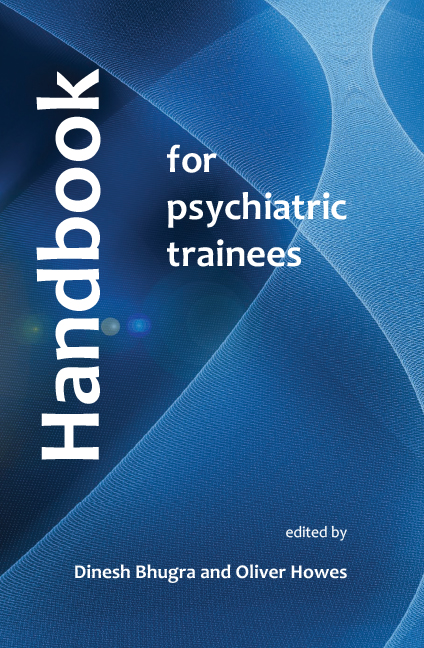Book contents
- Frontmatter
- Contents
- List of tables, boxes and figures
- List of contributors
- 1 Psychiatric training: the next steps
- Part 1
- Part 2
- Part 3
- 14 Personal safety
- 15 Managing violence
- 16 Managing difficult clinical situations
- 17 Understanding and managing stress
- 18 Managing time: the key to professional success
- 19 Negotiation skills
- 20 Presentation skills
- 21 Mental health review tribunals: reports and hearings
- 22 How to get published
- 23 Mental health informatics
- 24 Clinical governance
- 25 Lifelong learning and revalidation
- 26 Mentoring and shadowing
- 27 The MRCPsych examinations
- 28 Flexible training
- 29 UK training for overseas doctors and opportunities for UK doctors to train outside the EEC
- 30 Academic careers
- 31 Higher degrees
- Index
16 - Managing difficult clinical situations
from Part 3
- Frontmatter
- Contents
- List of tables, boxes and figures
- List of contributors
- 1 Psychiatric training: the next steps
- Part 1
- Part 2
- Part 3
- 14 Personal safety
- 15 Managing violence
- 16 Managing difficult clinical situations
- 17 Understanding and managing stress
- 18 Managing time: the key to professional success
- 19 Negotiation skills
- 20 Presentation skills
- 21 Mental health review tribunals: reports and hearings
- 22 How to get published
- 23 Mental health informatics
- 24 Clinical governance
- 25 Lifelong learning and revalidation
- 26 Mentoring and shadowing
- 27 The MRCPsych examinations
- 28 Flexible training
- 29 UK training for overseas doctors and opportunities for UK doctors to train outside the EEC
- 30 Academic careers
- 31 Higher degrees
- Index
Summary
The fundamental tool of good psychiatric practice is the taking of a thorough and thoughtful history and describing a mental state. Initially when trainees start psychiatry, this can seem quite straightforward: there are areas of enquiry, plus associated questions, followed by a description of phenomenology, based on observation. There are many texts devoted to the art of history-taking and mental state examination, for example the Maudsley Handbook of Practical Psychiatry (Goldberg & Murray, 2002).
The importance of these skills cannot be underestimated. They require time, practice and patience, all of which can be jettisoned in day-to-day clinical practice. Any trainee (hopefully) can spot severe and overt psychosis, but learning how to elicit more subtle phenomena, such as encapsulated delusions or ideas of reference, can take time and thought, as can less tangible aspects of history. Untoward incident enquiries and clinical reviews often reveal that aspects of history and mental state were ‘missed’.
I have chosen some common examples of situations where good clinical practice can be compromised. I will follow this with a discussion of so called ‘difficult patients’ and then certain types of encounters that can be problematic. I will conclude with suggestions for ensuring good practice.
Settings, situations and associated difficulties
Psychosexual history
In taking a history the trainee is exploring aspects of the patient'slife, mind and experiences that are personal and sensitive. One difficult situation can be the enquiry into psychosexual history, including questions about whether or not the patient has experiences of sexual abuse. (Linked is the enquiry into sexual fantasies and practices when assessing personality.) If the trainee is too intrusive, awkward and obviously embarrassed, then the patient can be left with feelings of guilt or shame, and it can even lead to the patient having an experience of abuse all over again. If the area is avoided altogether (often rationalised in terms of time or it being a first meeting), the patient may experience this as a message that this is not an area about which the trainee wants to know. Thus, an important aspect of that patient'semotional experience may be left out, again increasing shame. Awkwardness of this kind can be increased by issues of age, gender and cultural difference between the trainee and patient.
- Type
- Chapter
- Information
- Handbook for Psychiatric Trainees , pp. 144 - 156Publisher: Royal College of PsychiatristsPrint publication year: 2008



